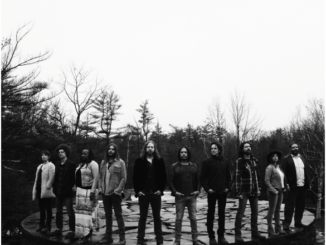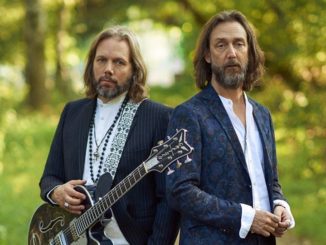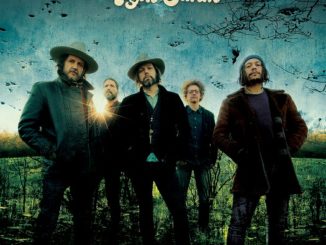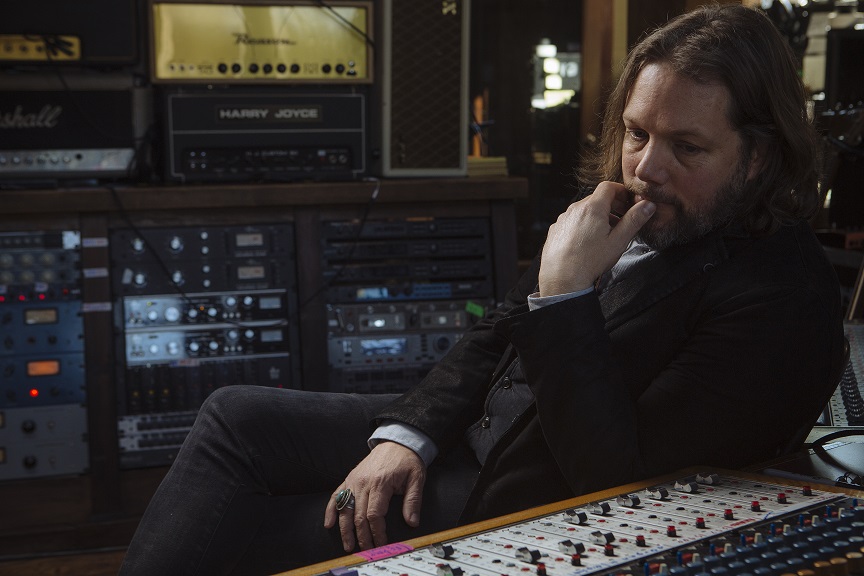
The Magpie Salute is the continuing story-line of The Black Crowes with Rich Robinson, Marc Ford and Sven Pipien. A group that represents a musical union of swaggering rock ‘n’ roll, psychedelic blues, and campfire-worthy storytelling, it also marks a reunion of musicians whose paths twisted and turned right back to each other. With their debut album ‘High Water I’ out now we caught up with Rich Robinson to find out more about what i think is destined to be the album of the year…
Mark: Hi Rich, how are you today Sir?
Rich: I’m alright thanks Mark.
Mark: Thank you so much for taking the time to talk to The Rockpit today, what can we say? ‘High Water I’ has to be my personal album of the year so far, it’s so rich, so real, so full, so textured, one of the most complete albums I’ve heard in a long time. It’s been out a week now, how pleased are you with the response so far?
Rich: Oh it’s been great, you know, people seem to really connect with it and like it and that’s why we do this.
Mark: Do you consider the Magpie Salute as a continuation of your musical journey that you started with The Black Crowes or does the band feel more like a fresh beginning for you?
Rich: I think everything is part of the continual journey, you now, I think everything is part of that overall path that I’ve been on. And I do think this fits with that path nicely, but I do think there’s new elements to this part of the journey – new people, a different approach. I write music the way I write music and when you shift context and you go from one band to another everyone’s going to bring their own thing to it. You now, Joe is a really different drummer than the drummer in The Crowes, John is a different singer than my brother, Matt Slocum, what he brings to the table with keys is incredibly different to what the last keyboard player in The Crowes did and I think those three different elements help shift maybe the familiarity of what Mark Ford and I sound like. And I think those are the things that move music forward in more of a natural way instead of trying to force something to sound different for the sake of sounding different. You know what I mean?
Mark: I do. So does that open new doors for you do you think? Did anything you didn’t expect happen in the studio?
Rich: No, but I think take a song like ‘Sister Moon’ which I think is really cool, it’ not a song I would have ever written, but it’s one of my favourites on the record, you know. It was something that Mark and John wrote and I thought wow, but literally that song would never be on a Crowes record, but I love it and I think it’s cool. So for this band to be able to go there it kind of shows our agility as musicians and it shows a whole other area of style, or music, or maybe the right word is influence to bring to the pot.
Mark: Of course over the years the best place to hear the music of The Black Crowes was always live and the Magpie Salute is packing in so many dates at the moment. How is the U.S. Tour going?
Rich: It’s cool, you know, it’s just a mixture of opening shows, there was this package we were on with this band called The Avett Brothers and Warren Hayes’ Gov’t Mule and then we did some shows with just us and Gov’t Mule, we also played with a band called Blackberry Smoke and then we’re doing some festivals and then we’re headlining a bunch of shows. The cool thing is that one night we’re playing forty-five minutes, the next night we’re playing two hours, the venues are changing, we’re playing in sheds and arenas and then we’ll do a club, and then play a festival, then on to a small theatre. I just think that’s kind of cool.
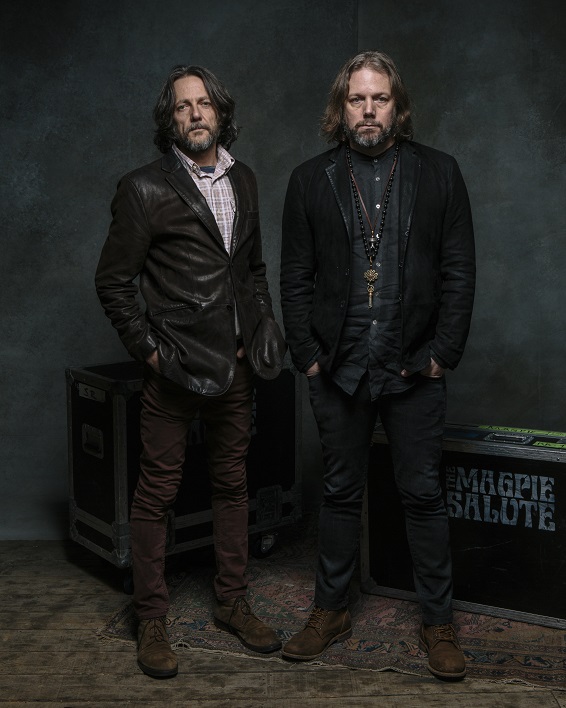
Mark: And it’s not only the size of the shows, you’re mixing it up with some acoustic dates too. You played a short European acoustic tour back in August that a friend of mine went to see in London and said you were amazing and then you’re back in Europe in November and December. What keeps drawing you back across the Atlantic?
Rich: Well we love playing in Europe, you know. I think that sometimes on an overall scale in The States there’s an element, and of course not everyone fits into this category but, I feel that people here are dealing with kind of losing their identity or losing the plot as a country, as a culture, it’s almost like we’ve kind of lost our rudder, you know. And I feel that after years and years of wealth, though obviously everything is relative, you know of being catered to as a country or as a people. Along the way I feel that a lot of people have lost their reverence for what artists do, and they kind of become these spoiled consumers that only want what they want, you know. They filter things out, they don’t want to be challenged or told, they want to decide what the ending of a movie’s gonna be, or they want to decide what a band should sound like, and that is totally counter to what art and creation is. And I think when you go to Europe, or when you just go outside of the U.S. people still have an understanding and a reverence for artists and how they live their lives. They (the artists) choose to take themselves out of this conventional life and they, you know, take a lot of risks. It’s difficult, it’s not the easiest way, it’s not like going to work at The Corporation and getting a check every week. You live and die by what you make. And when you go to Europe you really feel that, you really feel that people understand what you’re doing. Well I feel it. There are great people in the States, there are great fans in the States and they do come out and support the music but I think on the overall scale this country is really struggling, especially with this horror who is our president. I think that has made everyone really question reality on so many levels. I think a vast majority of people are looking at our country and thinking that we need to ‘reset’ you know what I mean? In a positive way.
Mark: I think that’s probably a positive way to look at it, maybe America had to go through this to come out the other side with as you say its values ‘reset’?
Rich: Well yes.
Mark: I think you’re right about Europe though, at the moment and I guess for many years now the music coming out of countries like the UK, Germany, The Netherlands, everywhere really sounds fresh and exciting and I think a good part of that is all about the kind of reverence for music that you’re talking about. People haven’t lost that wonder or forgotten the magic that really great music can bring.
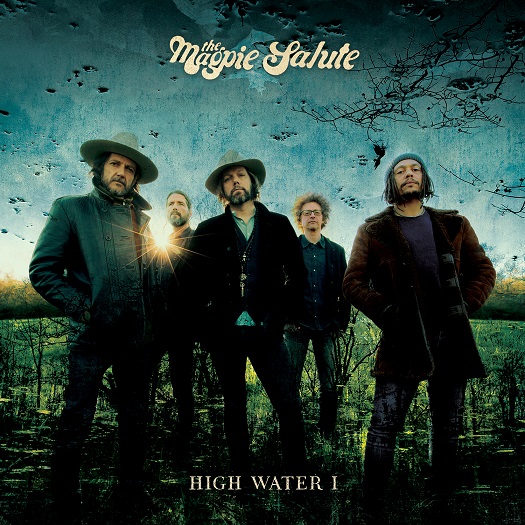
Mark: Let’s take it all the way back to the beginning. One of the questions I always wanted to ask you and I never got a chance during your time with The Black Crowes was where did this journey begin for you? Take it all the way back for us – what was it that made you realise that music was going to be your life? Was there a defining moment or a gradual realisation? Thinking back to your early memories of music, what was it that first made you decide you needed to be in a Rock and Roll band?
Rich: You know, some of the earliest memories I have are of my Dad listening to ‘Déjà Vu’ you know, Crosby, Stills, Nash and Young, he used to love ‘Carry On’ and I just remember, we had an old Console stereo, and just listening to that music and those harmonies… And I was maybe three or four but I remember it clearly and it was very strong and striking to me. And that kind of embedded a huge musical appreciation for me growing up and I think that is where it all started. And I carried that all the way through when I went on my own little journey, and then went on a journey with my brother. Chris was more of a musical expeditionary where he would go out and find the records and find the bands, but I would obsess over ‘the song’ you know what I mean?
Mark: I know exactly what you mean (laughs)
Rich: I would take the song apart and have to know exactly what everyone was doing. I’d need to know how it all worked together. And then when we got instruments for Christmas, my Dad had a nice guitar and I used to bang around on it, but he had enough so he bought me a guitar for Christmas so I would leave his stuff alone. But when that happened we never really said anything, never planned or talked it out, we just did it and then we just wrote that way, with songs we just knew what we were gonna do we didn’t have to say anything about it we just started doing it.
Mark: And it just grew organically from there.
Rich: Just naturally.
Mark: Taking a look at the album now, there’s a wonderful melting pot of sounds from the big and bold opener ‘Mary the Gypsy’ to the more touching moments like ‘Color Blind’ that has a really raw soulful feel and ‘Can you See Me’ which I think is one of my favourites at the moment. And then you have the riffs that maybe came from Mark like ‘Send Me an Omen.’ I was surprised to read yesterday that ‘High Water II’ will be out next year, were the two albums recorded contemporaneously?
Rich: We haven’t made ‘High Water II’ but when we went into the studio we recorded 29 songs so we have ‘High Water II’ ready but we also have a bunch of new songs that we’ve been writing on tour so we may just for the fun of it record a couple more for ‘High Water II’ and see what happens, you know what I mean, I don’t know. It’s always cool to have that problem, well I guess it’s not a problem really to have too many songs! But the cool thing is that we’re always writing, we’re always doing our stuff and I think that’s a good thing.
Mark: It’s a great problem to have definitely. How did it all begin with the new material? I know that obviously you were out there playing the Crowes songs and solo material on the road with the guys, but where did the new Magpie Salute songs begin?
Rich: Well last year was more about a celebration of our history. And this year is really about this record. So last year because the band came together in such a natural way, there wasn’t anything planned, there wasn’t this 5 year master-plan of what we were gonna do (laughs) Literally we played some songs at Woodstock and we thought, man that was really fun, so we played more shows and then we added a couple more and that was fun so we did a tour, and it just went from there. It was really natural in that sense, and that’s what I love about it because it was just so, and continues to be so organic since its inception.
Mark: Listening to the album, there’s a clear chemistry there that works and there are some very talented musicians on board. I wondered for you personally has the way that you approach song-writing changed much at all over the years?
Rich: No. I mean I have to do what makes me inspired ultimately and that’s just how it is. I write something, it makes me feel a certain way and then I think, OK cool I can do something with that and that’s how I’ve always been. So that element hasn’t changed because I don’t really just sit around and write, for me it’s never been a case of thinking ‘Oh its 2PM I’ve got to sit down and write’. I just pick up the guitar when I feel inspired to do so and it’s my belief that if you only do that when you’re inspired to do so than every time you pick up the guitar it’s a joy, you know.
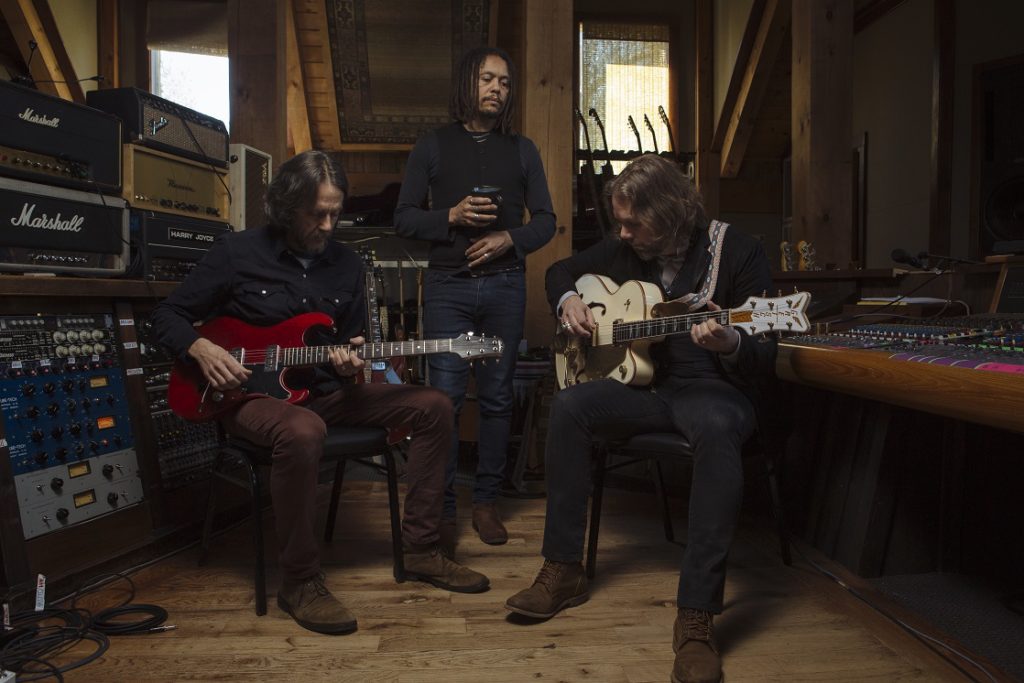
Mark: The music industry has changed so much over the years especially recently where it feels like we’re teetering on some accountant-fueled collapse. We had this vision years ago that music was far more than money it was almost spiritual. Do you think that music can still change the world?
Rich: I think it can, I think it’s a struggle right now and I really think it’s corporations and the corporate culture that has really decimated any creativity, because it’s just these cynical assholes that took over, and just these little business guys that just count numbers all day. I don’t know how it is in Australia but in the States it’s tough, you know, when we talk about reverence and we talk about actually understanding what artists do. It’s not just music, shit man you see these brilliant actors selling care insurance on TV because there’s no movies for them to make, what a shame, you know what I mean. And no one sees the problem. It’s a real bummer. In my opinion there should be art for people to make, you grow up being this actor and you have this brilliant gift to move people and the shame is that these studios have all conglomerated and they’ve gone down this path where all they care about is Superhero movies, and there’s no real writing anymore. So I think it’s a really challenging and dismal time for the creative arts – they cut funding to schools, they cut funding to music programs because these people don’t care. And then you have this rise of computers and AI, this rise of people shopping at home, the Country and the World, for what? The sake of convenience in my opinion is forgetting about what’s important. Anything that might not necessarily be convenient is too hard. So I think that the music industry has shifted again to this horrible place, I mean in the States you have Spotify and streaming and you can stream millions and millions of songs billions of times and they don’t pay the fucking artists. They say they do but they don’t, or they pay the label and the label doesn’t pay the artists. This whole industry is built on the backs of these artists, on the backs of these musicians writing music, and they don’t care, it’s almost like the artist is a pain in their ass, although they take the artist’s work and they make millions of dollars off of it. And I think that all adds to the reason why there’s no respect and no reverence. If you’re bombarded by something from a sensual standpoint: you walk into a grocery store there’s music, you walk into a Starbucks there’s music you walk into a gas station there’s music, there’s music on the way to school, music on your phone, if you’re just bombarded all the time by music you lose your respect for it because it’s just there all the time. And I feel like there are rays of light, I mean the cool thing about vinyl making a comeback is that it kind of forces you to have an experience.
Mark: Exactly, it does, I love the ritual.
Rich: Right, you have to physically take the record out, you know, put it on the turntable, put the needle on the vinyl, and it kind of forces you to focus and listen to this thing. You know there are some cool young bands out there that I feel get that, and they’re going out there and they’re making great music. And I feel that there will be a shift, but right now it’s tough man, you have to get on the mountain and scream with the eight million other people to try to have someone look at you, let alone pay attention to what a band is doing. It’s like ‘March of the Penguins’ or something!
Mark: That’s a great image. It feels like this interview has flown by, I could talk all day and we’ve only just scratched the surface. I’ll leave you with an easy one if I may – what is the meaning of life?
Rich: (laughs) In my opinion for your soul to come here and learn and move forwards as a beautiful soul to the next life or the next place or physical reality.
Mark: Thank you so much for taking the time to talk to us today and give us this exclusive Australian Interview. ‘High Water I” is a wonderful album and let’s hope it’s the first of many more to come. I have a vinyl copy of the album ready to give another spin as we speak.
Rich: (laughs) Enjoy that and hopefully we’ll get down there soon. Thanks Mark.

